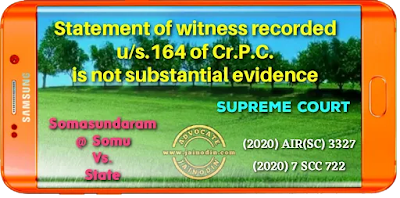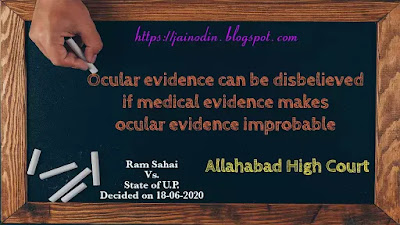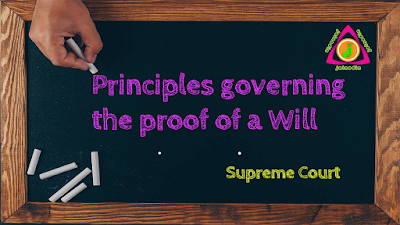17. Now as regards the proving of such information, the matter seems to us to be governed by Sections 60, 159 and 160 of the Evidence Act. It is correct that statements and reports prepared outside the court cannot by themselves be accepted as primary or substantive evidence of the facts stated therein. Section 60 of the Evidence Act lays down that oral evidence must, in all cases whatever, be direct, that is to say, if it refers to a fact which could be seen, it must be the evidence of a witness who says he saw it, and if it refers to a fact which could be heard, it must be the evidence of a witness who says he heard it and so on. Section 159 then permits a witness while under examination to refresh his memory by referring to any writing made by himself at the time of the transaction concerning which he is questioned, or so soon afterwards that the court considers it likely that the transaction was at that time fresh in the memory. Again, with the permission of the court, the witness may refresh, his memory by referring to a copy of such document. And the witness may even refer to any such writing made by any other person but which was read by him at the time the transaction was fresh in his memory and when he read it, he knew it to be correct. Section 160 then provides for cases where the witness has no independent recollection say, from lapse of memory, of the transaction to which he wants to testify by looking at the document and states that although he has no such recollection he is sure that the contents of the document were correctly recorded at the time they were. It seems to us that where a case of this character arises and the document itself has been tendered in evidence, the document becomes primary evidence in the case. See Jagan Nath v. Emperor, AIR 1932 Lah 7.
The fundamental distinction between the two sections is that while under Section 159 it is the witness's memory or recollection which is evidence, the document itself not having been tendered in evidence; under Section 160, it is the document which is evidence of the facts contained in it. It has been further held that in order to bring a case under Section 160, though the witness should ordinarily affirm on oath that he does not recollect the facts mentioned in the document, the mere omission to say so will not make the document inadmissible provided the witness swears that he is sure that the facts are correctly recorded in the document itself. Thus in Partab Singh v. Emperor, AIR 1926 Lah 310 it was held that where the surrounding circumstances intervening between the recording of a statement and the trial would as a matter of normal human experience render it impossible for a police officer to recollect and reproduce the words used, his statement should be treated as if he had prefaced it by stating categorically that he could not remember what the deceased in that case had said to him. Putting the whole thing in somewhat different language, what was held was that Section 160 of the Act applies equally when the witness states in so many words that he has no independent recollection of the precise words used, or when it should stand established beyond doubt that that should be so as a matter of natural and necessary conclusion from the surrounding circumstances.
18. Again, in Krishnama v. Emperor, AIR 1931 Mad 430 a Sub-Assistant Surgeon recorded the statement made by the deceased just before his death, which took place in April, 1930, and the former was called upon to give evidence some time in July, 1930. In the Sessions Court he just put in the recorded statement of the deceased which was admitted in evidence. On appeal it was objected that such statement was wrongly admitted inasmuch as the witness did not use it to refresh his memory nor did he attempt from recollection to reproduce the words used by the accused. It was held that he could not have been expected to reproduce the words of the deceased, and therefore, he was entitled to put in the document as a correct record of what the deponent had said at the time on the theory that the statement should be treated as if the witness had prefaced it by stating categorically that he could not remember what the deceased had said.
19. Again in Public Prosecutor v. Venkatarama Naidu, AIR 1943 Mad 542, the question arose how the notes of a speech taken by a police officer be admitted in evidence. It was held that it was not necessary that the officer should be made to testify orally after referring to those notes. The police officer should describe his attendance, the making of the relevant speech and give a description of its nature so as to identify his presence there and his attention to what was going on, and that after that it was quite enough it he said "I wrote down that speech and this is what I took down," and if the prosecution had done that, they would be considered to have proved the words. This case refers to a decision of the Lahore High Court in Om Prakash v. Emperor, AIR 1930 Lah 867 wherein the contention was raised that the notes of a speech taken by a police officer were not admissible in evidence as he did not testify orally as to the speech and had not refreshed his memory under Section 159 of the Evidence Act from those notes. It was held that instead of deposing orally as to the speech made by the appellant, the police officer had put in the notes made by him, and that there would be no difference between this procedure and the police officer deposing orally after reference to those notes, and that for all practical purposes, that would be one and the same thing.
20. The same view appears to us to have been taken in Emperor v. Balaram Das, AIR 1922 Cal 382 (2).
21. From the discussion that we have made, we think that the correct legal position is somewhat like this. Normally, a police officer (or a Motbir) should reproduce the contents, of the statement made by the accused under Section 27 of the Evidence Act in Court by refreshing his memory under Section 159 of the Evidence Act from the memo earlier prepared thereof by him at the time the statement had been made to him or in his presence and which was recorded at the same time or soon after the making of it and that would be a perfectly unexceptionable way of proving such a statement. We do not think in this connection, however, that it would be correct to say that he can refer to the memo under Section 159 of the Evidence Act only if he establishes a case of lack of recollection and not otherwise. We further think that where the police officer swears that he does not remember the exact words used by the accused from lapse of time or a like cause or even where he does not positively say so but it is reasonably established from the surrounding circumstances (chief of which would be the intervening time between the making of the statement and the recording of the witness's deposition at the trial) that it could hardly be expected in the natural course of human conduct that he could or would have a precise or dependable recollection of the same, then under Section 160 of the Evidence Act, it would be open to the witness to rely on the document itself and swear that the contents thereof are correct where he is sure that they are so and such a case would naturally arise where he happens to have recorded the statement himself or where it has been recorded by some one else but in his own presence, and in such a case the document itself would be acceptable substantive evidence of the facts contained therein. With respect, we should further make it clear that in so far as Chhangani, J.'s holds to the contrary, we are unable to accept it as laying down the correct law. We hold accordingly."












